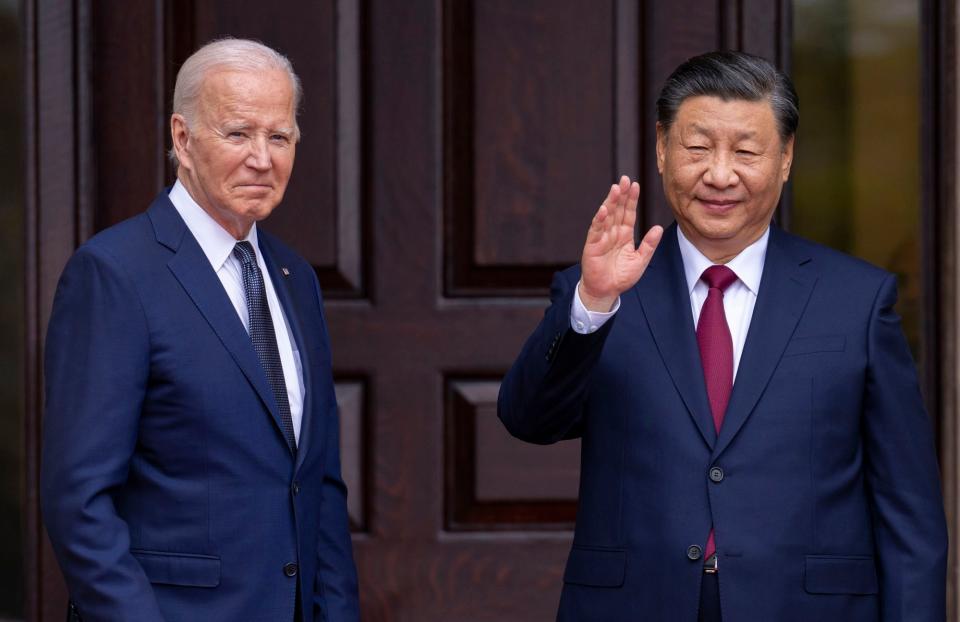Clash or coexist? Defusing US-China tensions remains uncertain, even unlikely, analysts say
Beijing promises not to take Taiwan by force. Washington vows not to work towards overthrowing the Chinese Communist Party.
These are among the difficult, perhaps politically impossible, steps that would be needed to avoid a US-China war and approximate some version of coexistence, according to former CIA, Pentagon and other strategic experts.
And many are convinced that conflict is more likely than not.
Do you have questions about the biggest topics and trends from around the world? Get the answers with SCMP Knowledge, our new platform of curated content with explainers, FAQs, analyses and infographics brought to you by our award-winning team.
"The concept of peaceful coexistence is very laudable as a long-term aspirational goal. But I think it's a bridge too far in today's environment," said Dennis Wilder, a foreign service professor at Georgetown University who oversaw the East Asia and Pacific desk in 2015 and 2016 for the Central Intelligence Agency.
"It is a strategic competition that we have to be careful does not intensify to the point that it ignites a new Cold War or World War III."
A key problem, added Wilder, is that both countries pride themselves on being "hyper exceptional" stand-outs in human history - a view that does not engender humility or accommodation.
Where the US regards itself as a "city on the hill" that represents the best democracy ever, China considers itself the guardian of 5,000 years of history, a near perfect blend of Confucianism and Marxism, Wilder said. And while Beijing views the US as trying to contain China, Washington sees China as a hegemonic power intent on replacing it.
Coexistence between a rapidly rising China and the US in relative decline will be difficult in the years ahead given entrenched ideologies, deep distrust and their poor record of compromise, experts said. This comes as tensions continue to mount over Taiwan, the South China Sea, the Ukraine war, hi-tech exports, economic coercion and military alliances.
"The differences in our underlying values are very great," Wilder added. "This is a reality we have to live with."
Conflict is not inevitable, contended Michael Mazarr, a senior political scientist with the Rand Corporation. "Coexistence is possible and necessary," added the former special assistant to the chairman of the US Joint Chiefs of Staff. "But I'm not sure it's likely."
Steps that Washington might take to avoid or minimise conflict, experts said, include adopting foreign policy beyond competing with China; living with sizeable Chinese influence in parts of the world; assuring Beijing the US has no interest in Taiwanese independence; scaling back military operations on China's immediate periphery; and committing to free and fair trade.
China's to-do list, they said, should include scaling back its desire for Indo-Pacific dominance; and ending large-scale industrial espionage, territorial coercion of its neighbours and punitive measures against countries it considers insulting on Taiwan or other "core" issues.
Other measures China could take, experts at a recent panel at the Harvard College China Forum said, would be to: adopt a new economic model not based on massive exports and trade surpluses; assure Washington it has no interest in meddling in US elections; similarly commit to free and fair trade; and back off of cyberattacks and hacking - particularly against political and social targets.
"It's a fairly ambitious list," conceded Mazarr, formerly associate dean at the US National War College. "Because in this relationship China is the rising and dissatisfied power, it is more on the edge of pushing its ambitions than perhaps the United States."
Yuhua Wang, a government professor at Harvard, argued that an added problem is severed communication, reinforcing stereotypes on both sides. While some 290,000 Chinese studied in the US during the 2022-23 academic year, only around 700 American students were in mainland China - compared with close to 25,000 a decade ago - with limited numbers in the pipeline.
"This is only the downstream symptom of deeper problems," said Wang. "The United States has a huge deficiency in Chinese language that, in the long term, will significantly affect the chances of having peaceful coexistence."
A Rand report in April, "The Fate of Nations: Varieties of Success and Failure for Great Powers in Long-Term Rivalries", reviewed 30 great-power rivalries between 1816 and 2010 and found that they tended to end in one of three ways: one side collapsed or lost a war; one or the other party gave up, unable to keep pace technologically or economically; or they transcend the competition, deciding that getting along even as they safeguarded core national interests was better than continually scoring points.
"Sometimes that realisation only comes after disaster," Mazarr said.
In the US-China context, Taiwan is the most obvious potential hot-war crisis.
There are some small signs of optimism in a relationship that Tsinghua University professor Da Wei has called "uncomfortable coexistence".
The summit between US President Joe Biden and Chinese leader Xi Jinping in California in November aimed to stabilise relations that were previously in free fall, epitomised by the US downing of a Chinese surveillance balloon that had transited across North America earlier that year.

US President Joe Biden and Chinese President Xi Jinping in California on November 15, 2023. Photo: The New York Times via AP alt=US President Joe Biden and Chinese President Xi Jinping in California on November 15, 2023. Photo: The New York Times via AP>
"We've been lucky so far," said William Thompson, emeritus professor of political science at Indiana University, Bloomington. "There are things that are very difficult for politicians to control."
"If you're talking about verbal assurances, they're not worth much," he added. "Neither side trusts the other side much to do what they say."
While the Biden-Xi summit set a crucial tone from the top, with readouts scripted and every detail pored over globally, at least as important are trust-building measures out of the limelight, analysts noted.
A better indication of progress are the meetings between Chinese Foreign Minister Wang Yi and US national security adviser Jake Sullivan in Vienna and Malta last year and in Thailand in January, analysts said. They were authorised by their respective leaders to negotiate, often spent 10 or more hours together and kept the outcomes secret.
Wilder recalled that, as a young official in 2008 in the George W. Bush administration, he accompanied the US deputy secretary of state John Negroponte over two days with Negroponte's Chinese counterpart, the executive vice foreign minister Dai Bingguo in Dai's home city of Guiyang.
"We wanted to work with him," said Wilder. "And it was very, very productive on a strategic level. That's why Wang Yi and Sullivan have to do this."

US national security adviser Jake Sullivan and Chinese Foreign Minister Wang Yi in Malta on September 16, 2023. Photo: Xinhua via AP alt=US national security adviser Jake Sullivan and Chinese Foreign Minister Wang Yi in Malta on September 16, 2023. Photo: Xinhua via AP>
Beijing has not helped itself, some analysts said, given its restrictive visa policies, aggressive "wolf warrior" diplomacy, lack of transparency and espionage campaigns against foreign companies and citizens.
Even so, they added, US policymakers' and lawmakers' ignorance about how China works was notable.
Conservative Republican lawmakers routinely excoriate the Chinese Communist Party - such as when Senator Tom Cotton of Arkansas repeatedly grilled TikTok chief executive Shou Zi Chew on whether he was a member of the CCP. Chew is Singaporean.
"Nobody joins the Communist Party because they believe in communism," said Wang. "They join the Communist Party because they can find a better job."
Some analysts bristle at the coexistence nomenclature.
"The goal is not to have good US-China relationship. The goal is to protect American interests in ways that don't end up in a war with China," said Bonnie Glaser, managing director of the German Marshall Fund of the United States.
The focus, she insisted, should be on reassuring US allies, the most consequential part of Washington's China policy. "They don't want to hear we're trying to overthrow the CCP," Glaser said. "Managing risk is the right way to frame it."

The goal, Bonnie Glaser, managing director of the German Marshall Fund of the United States, says, " is to protect American interests in ways that don't end up in a war with China". Photo: Facebook alt=The goal, Bonnie Glaser, managing director of the German Marshall Fund of the United States, says, " is to protect American interests in ways that don't end up in a war with China". Photo: Facebook>
Antagonism between great powers can extend over multiple decades, waxing and waning, apparently settled only to resurface. Assuming no decisive "tipping point" by 2049 - the centenary of modern China - the US-China rivalry would be 100 years old, having endured numerous chapters, analysts said.
In 2017, for instance, China looked like it would soon overtake the US in gross domestic product, its rise inexorable. Now the future is less clear, as China struggles with a property crisis and the US economy has surged.
Likewise, in 1991 it appeared that the five-decade Cold War between the US and Soviet Union was over, only to see Washington-Moscow tensions resurface in recent years in aggressive new forms.
Economic vitality over an extended period, global stature and the ability to outspend a rival were also significant factors in determining which side prevailed in past rivalries, experts said.
On that count, China's vulnerabilities include demographics, mounting debt, youth unemployment and questions over political succession and whether its economic model has topped out.
The US must deal with deep partisan political differences, amid questions over whether the Chips and Science Act and other government programmes will be enough to reboot its physical and intellectual infrastructure, supply chains, education and skills gap.
Both confront troubling inequity gaps between the rich and poor.
And while some fear a US-China confrontation is all but inevitable, experts said, losing a battle or war is not always decisive in which side ultimately prevails. Furthermore, history remains an imperfect guide and new factors can change the dynamic.
"There is no guarantee of a tipping point" and the superpower rivalry could muddle along indefinitely, the Rand report concluded.
"China may surmount many of its looming challenges; the United States may overcome its political gridlock; both may benefit from emerging technologies and achieve new phases of economic progress."
Mazarr said he believed that the US is ultimately in pole position to prevail given its global stature, geography and world-class companies. Williams sees China's sphere of global influence expanding over the next half-century and Washington's contracting.
Few underestimate the stakes.
"In The Art of War, Sun Tzu reminded his readers of the dangers," said Wilder. "And he said 'war is a great matter of states not to be taken lightly because, if you lose the war, you lose the state'.
"And we are both in danger of losing the war."
This article originally appeared in the South China Morning Post (SCMP), the most authoritative voice reporting on China and Asia for more than a century. For more SCMP stories, please explore the SCMP app or visit the SCMP's Facebook and Twitter pages. Copyright © 2024 South China Morning Post Publishers Ltd. All rights reserved.
Copyright (c) 2024. South China Morning Post Publishers Ltd. All rights reserved.

 Yahoo Finance
Yahoo Finance